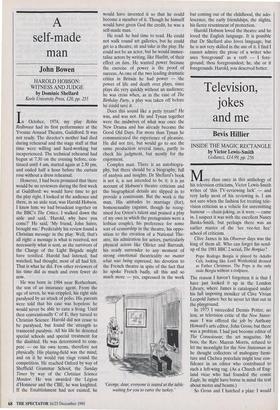self-made man
John Bowen
HAROLD HOBSON: WITNESS AND JUDGE by Dominic Shellard Keele University Press, £20, pp. 255 I n October, 1974, my play Robin Redbreast had its first performance at the Yvonne Arnaud Theatre, Guildford. It was not ready. The director's mother had died during rehearsal and the stage staff at that time were willing and hard-working but inexperienced. The technical rehearsal had begun at 7.30 on the evening before, con- tinued until 4 am, started again at 2.30 pm, and ended half a hour before the curtain rose without a dress rehearsal.
However, I had been promised that there would be no reviewers during the first week at Guildford: we would have time to get the play right. I looked at the audience and there, in an aisle seat, was Harold Hobson. I knew him; we had broadcast together on the BBC's The Critics. I walked down the aisle and said, 'Harold, why have you come?' He said, 'My friend, John Sutro, brought me.' Predictably his review found a Christian message in the play. Well, that's all right: a message is what is received, not necessarily what is sent, as the survivors of the Charge of the Light Brigade might have testified. Harold had listened, had watched, had thought, most of all had felt. That is what he did. Few other reviewers of his time did as much and even fewer do now.
He was born in 1904 near Rotherham, the son of an insurance agent. From the age of seven, he was crippled, his right side paralysed by an attack of polio. His parents were told that his case was hopeless; he would never be able to earn a living. Until then conventionally C of E, they turned to Christian Science. Harold did not cease to be paralysed, but found the strength to transcend paralysis. All his life he detested special schools and special treatment for the disabled. He was determined to com- pete — on his own terms, therefore not physically. His playing-field was the mind, and on it he would run rings round the competition. He reached Oxford by way of Sheffield Grammar School, the Sunday Times by way of the Christian Science Monitor. He was awarded the Legion d'Honneur and the CBE, he was knighted. If the Establishment had not existed, he would have invented it so that he could become a member of it. Though he himself would have given God the credit, he was a self-made man.
He read: he had time to read. He could not walk round art galleries, but he could get to a theatre, sit and take in the play. He could not be an actor, but he would immor- talise actors by writing, like Hazlitt, of their effect on him. He wanted power because the exercise of power is the proof of success. As one of the two leading dramatic critics in Britain he had power — the power of life and death over plays, since plays die very quickly without an audience; he was cross when, as in the case of The Birthday Party, a play was taken off before he could save it.
Does this sound like a petty tyrant? He was, and was not. He and Tynan together were the midwives of what was once the New Drama and has already become the Good Old Days. Far more than Tynan he communicated the experience of pleasure. He did not tire, but would go to see the same production several times, partly to check his judgment, but mostly for the enjoyment.
Complex man. There is an autobiogra- phy, but there should be a biography, full of analysis and insights. Dr Shellard's book is not it, is not intended to be it; it is an account of Hobson's theatre criticism and the biographical details are slipped in to provide a continuum. But the work is the man. His attitudes to marriage (for), homosexuality (against, though he recog- nised Joe Orton's talent and praised a play of my own in which the protagonists were a lesbian couple), his preference for some sort of censorship in the theatre, his oppo- sition to the creation of a National The- atre, his admiration for actors, particularly physical actors like Olivier and Barrault, his ready surrender to any moment of strong emotional theatricality no matter what was being expressed, his devotion to the French theatre in spite of the fact that he spoke French badly, all this and so much more — yes, expressed in the work `George, dear, everyone is seated at the table waiting for you to carve the turkey.' but coming out of the childhood, the ado- lescence, the early friendships, the slights, his fierce resentment of protection.
Harold Hobson loved the theatre and he loved the English language. It is possible that Dr Shellard also loves language, but he is not very skilled in the use of it. I find I cannot admire the prose of a writer who uses 'foreground' as a verb — I fore- ground; thou foregroundest; he, she or it foregrounds. Harold, you deserved better.










































































































 Previous page
Previous page